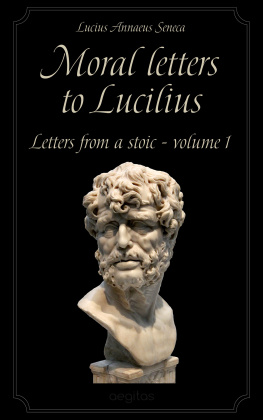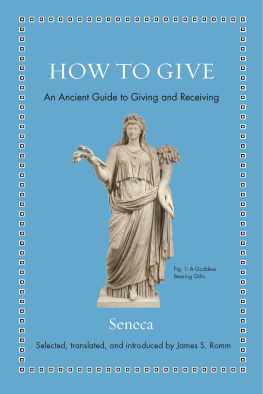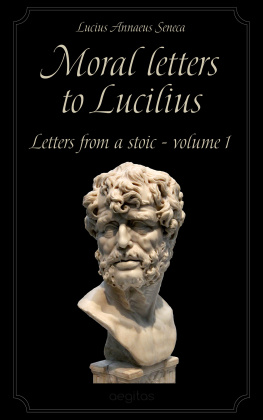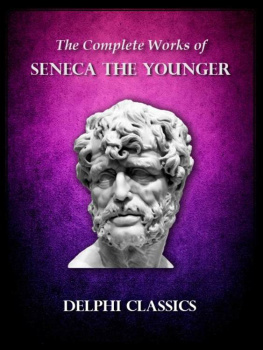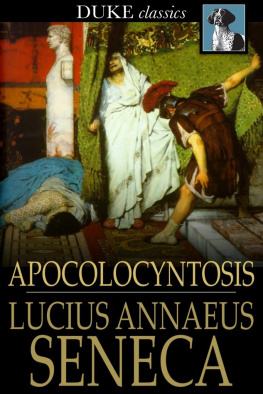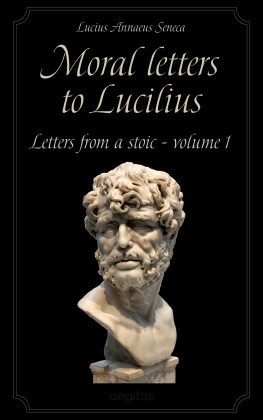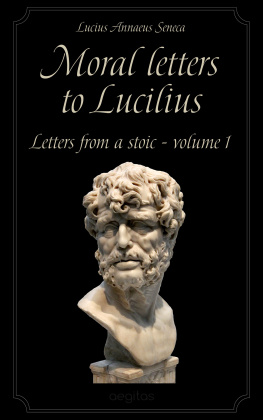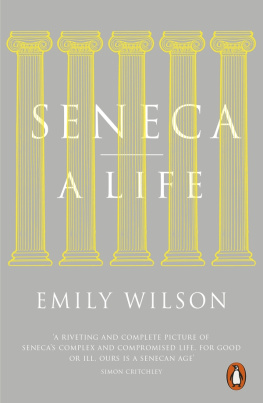Seneca - Seneca: Selected Dialogues and Consolations (Hackett Classics)
Here you can read online Seneca - Seneca: Selected Dialogues and Consolations (Hackett Classics) full text of the book (entire story) in english for free. Download pdf and epub, get meaning, cover and reviews about this ebook. year: 2015, publisher: Hackett Publishing Company, Inc., genre: Religion. Description of the work, (preface) as well as reviews are available. Best literature library LitArk.com created for fans of good reading and offers a wide selection of genres:
Romance novel
Science fiction
Adventure
Detective
Science
History
Home and family
Prose
Art
Politics
Computer
Non-fiction
Religion
Business
Children
Humor
Choose a favorite category and find really read worthwhile books. Enjoy immersion in the world of imagination, feel the emotions of the characters or learn something new for yourself, make an fascinating discovery.
Seneca: Selected Dialogues and Consolations (Hackett Classics): summary, description and annotation
We offer to read an annotation, description, summary or preface (depends on what the author of the book "Seneca: Selected Dialogues and Consolations (Hackett Classics)" wrote himself). If you haven't found the necessary information about the book — write in the comments, we will try to find it.
Seneca: author's other books
Who wrote Seneca: Selected Dialogues and Consolations (Hackett Classics)? Find out the surname, the name of the author of the book and a list of all author's works by series.
Seneca: Selected Dialogues and Consolations (Hackett Classics) — read online for free the complete book (whole text) full work
Below is the text of the book, divided by pages. System saving the place of the last page read, allows you to conveniently read the book "Seneca: Selected Dialogues and Consolations (Hackett Classics)" online for free, without having to search again every time where you left off. Put a bookmark, and you can go to the page where you finished reading at any time.
Font size:
Interval:
Bookmark:


SENECA
Selected Dialogues
and Consolations
SENECA
Selected Dialogues
and Consolations
Translated, with Introduction and Notes, by
Peter J. Anderson
Hackett Publishing Company, Inc.
Indianapolis/Cambridge
Copyright 2015 by Hackett Publishing Company, Inc.
All rights reserved
Printed in the United States of America
18 17 16 15 1 2 3 4 5 6 7
For further information, please address
Hackett Publishing Company, Inc.
P.O. Box 44937
Indianapolis, Indiana 46244-0937
www.hackettpublishing.com
Interior design by Elizabeth L. Wilson
Composition by Aptara Inc.
Library of Congress Cataloging-in-Publication Data
Seneca, Lucius Annaeus, approximately 4 B.C.65 A.D., author.
[Works. Selections. English]
Seneca : Selected dialogues and consolations / Translated, with Introduction and Notes, by Peter J. Anderson.
pages cm
Includes bibliographical references and index.
ISBN 978-1-62466-369-7 (cloth)ISBN 978-1-62466-368-0 (pbk.)
1. Seneca, Lucius Annaeus, approximately 4 B.C.65 A.D.Translations into English. I. Anderson, Peter J., 1970 translator. II. Title.
PA6661.A7S48 2015
188dc23
2014034853
ePub ISBN: 978-1-62466-387-1
Cum potuero, vivam quomodo oportet.
For my family.
The Stoics Reader: Selected Writings and Testimonia . Translated, with Introduction, by Brad Inwood and Lloyd P. Gerson.
Readings in Ancient Greek Philosophy . Edited by S. Marc Cohen, Patricia Curd, and C. D. C. Reeve.
Introductory Readings in Ancient Greek and Roman Philosophy . Edited by C. D. C. Reeve and Patrick Lee Miller. General Introduction by Lloyd P. Gerson.
Contents
On the Resolute Nature of the Wise Man
( De Constantia Sapientis )
Consolation to His Mother Helvia
( Ad Helviam Matrem De Consolatione )
I offer my gratitude to Brian Rak, Charles Brittain, Margaret Graver, R. Scott Smith, William O. Stephens, Emily Wilson, and anonymous readers for Hackett who labored over my translations, offering both encouragement and criticism. I could not have hoped for better critical support in producing this translation. Thank you to my wonderful colleagues at Grand Valley State University, especially William Levitan, Diane Rayor, and the late Barbara Flaschenriem, for encouragement and sage advice.
Institutional support for this project was provided at various stages by Grand Valley State University, through a summer research stipend and a precious sabbatical leave, and by The Margo Tytus Visiting Scholars Program at the University of Cincinnati, Classics Department.
Of the many people who have labored in hidden ways, sometimes even unknown to themselves, I must mention two of my teachers: William Johnson, who taught me to value my own work and still keep revising, and Rick Powell, who helped teach me to value myself and also to appreciate the ways in which energy properly applied can produce interesting results. Many students have read Seneca with me, in Latin or in English, and each of them has taught me something that benefited the whole. Most of all, and in all things, my heartfelt gratitude goes to the wonderful Gretchen Galbraith, who has probably read these translations more often than I have and certainly with keener eyes. Even all of these people were not sufficient to catch every one of my errors. For the errors that remain I ask for your patience and understanding.
Little is known about the early years of Senecas life, although much can be surmised about its general course from its historical and social contexts. Senecas family was wealthy and prominent, part of the provincial equestrian elite of Spain who, along with elite families from Gaul, would come to strongly influence literary and political life at Rome from the mid- and late first century CE on. He was born in Corduba, Spain, sometime between 4 BCE and 1 BCE. The expansion of Roman power and culture into Spain began during the Punic Wars in the third century BCE , although Roman dominance was strongly resisted by certain tribes for over 200 years after that. Corduba was captured and made into a Roman garrison town when the two Roman Spanish provinces ( Hispania Citerior , nearer Spain, and Hispania Ulterior , farther Spain) were established in 206 BCE. By the time of Senecas birth, Corduba was the Roman provincial capital of Hispania Ulterior (from Almeria along the southern coast to Portugal, and stretching northward into the Guadalquivir), and thoroughly Romanized. His father, Marcus (or Lucius) Annaeus Seneca, was a distinguished teacher of rhetoric, and Seneca seems to have joined him at Rome before the age of ten. There he was given the normal elite education in literature, languages, rhetoric, and, as a young man, philosophy. He had two brothers, the elder of whom, Julius Annaeus Gallio, entered politics and rose to a distinguished rank. The younger brother, Annaeus Mela, lived a life apart from politics; his son (Senecas nephew) was the famous poet Lucan, later charged with treason in the plot of 65 CE that also led to Senecas compelled suicide. Senecas fathers and his fathers familys position and talents ensured him access to patrons who supported early political activities, but Senecas career seems to have started only under Emperor Tiberius in 33 CE and progressed quite slowly. Even so, he eventually reached senatorial rank and must have been an astute politician. To be active in politics during the reigns of four emperors very different in style and characterTiberius (1437 CE), Gaius Caligula (3741 CE), Claudius (4154 CE), and Nero (5468 CE)was no mean feat. Our best and most certain knowledge about Senecas life comes from the period starting with his exile on Corsica under Emperor Claudius (4149 CE) until his death in 65 CE.
The reasons for Senecas exile are not fully discussed in any of his works, but he seems to have been implicated in an adulterous affair with Julia Livilla, a member of the imperial family, either as a facilitator or a participant. But none of the other sources that mention it consider Seneca actually guilty, and there are good reasons from Senecas several comments about the charge and trial to suppose that the charge was exaggerated. Indeed, Emperor Claudius reduced the sentence from death to exile. In 49 CE Seneca was recalled by Claudius to Rome through the machinations of Agrippina, mother of Nero. Shortly afterward, he began as the young Neros tutor and advisor (Nero was about twelve years old), a role that he maintained through Neros adoption as heir by Claudius and into the first years of his reign. Seneca, now a senator, continued to give political advice, write speeches, and offer moral guidance to the young and talented Nero; he seems to have helped shape policy along with other amici (friends) of the emperor, who served as a sort of informal court; and he seems to have been key in securing positions for people of talent and for his family and friends, many of whom were also people of talent. Senecas deep involvement in political affairs is consonant with his Stoic principles. His attempts to finally withdraw from Neros circle of advisors were similarly motivated: Seneca seems to have perceived that his influence over the increasingly erratic emperor was entirely gone. Senecas first attempt to withdraw in 62 CE was refused, as was a second in 64 CE, although at that point Seneca secluded himself anyway, using ill health as a reason to not attend Nero. In 65 CE a failed plot revealed extensive opposition to Nero among high-ranking members of the Senate and his own advisors, and Nero ordered many suicides. Seneca was ordered to commit suicide in late spring 65 CEan order he obeyed, modeling his death on that of Socrates. The death scene itself, as described in Tacitus (who is sympathetic) and Cassius Dio (who is not) clearly displays Senecas own thinking about suicidenamely, that it should be an entirely rational decision, undertaken only when every other option has been exhausted, and even then only when circumstances are such that ones life may not be lived in accordance with virtue. The scene also displays Senecas penchant for drama and making an impression, and the extent of his affection for his family and friends (both of which we also see in his writings). Tacitus description in his Annals 15.6064 is quite moving; I will not paraphrase here, trusting the reader to find one of many translations available in print or online.
Font size:
Interval:
Bookmark:
Similar books «Seneca: Selected Dialogues and Consolations (Hackett Classics)»
Look at similar books to Seneca: Selected Dialogues and Consolations (Hackett Classics). We have selected literature similar in name and meaning in the hope of providing readers with more options to find new, interesting, not yet read works.
Discussion, reviews of the book Seneca: Selected Dialogues and Consolations (Hackett Classics) and just readers' own opinions. Leave your comments, write what you think about the work, its meaning or the main characters. Specify what exactly you liked and what you didn't like, and why you think so.



